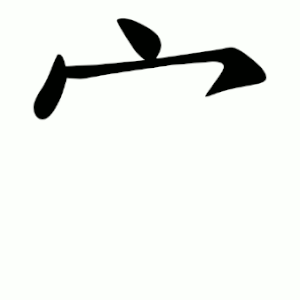宀
- house;
A type of deep house with walls on all four sides, a roof, a main hall, and back rooms.
Usage in Korean
In South Korea, Japan, and China, 宀 is never used alone as an independent character; it only appears as a radical within other characters.
宀 is positioned at the "top" of Chinese characters to form many different characters.
Although characters with the 宀 radical have various meanings and few commonalities, since 宀 is a pictograph representing a roof, many of these characters relate somewhat to houses or homes.
Representative characters meaning house/home include:
家 (home)
室 (room)
宮 (palace)
宇 (house, eaves)
宙 (space, universe)
宅 (residence)
Other meanings include:
安 (peaceful)
定 (to decide)
完 (complete)
容 (appearance)
寤 (to wake)
富 (wealthy)
實 (fruit, reality)
寶 (treasure)
客 (guest)
害 (harm)
Similar shape characters
Be careful not to confuse 宀 with the 穴 radical.
As explained in the 穴 article, 穴 is a different radical that also appears at the top of characters, making it easy to mix up.
Characters like 字 (character), 蜜 (honey), 賓 (guest), and 憲 (law) do not have the 宀 radical.
Though the meaning of 宀 is "roof," when used as a radical, it is often called “갓머리” (literally “hat top”).
Characters with 宀
- 戈月 (IB)
- 難戈月 (XIB)
- ⿱ 丶 冖
